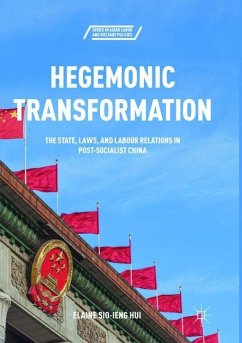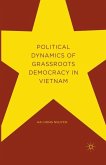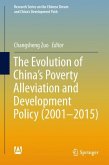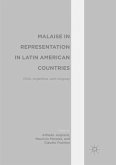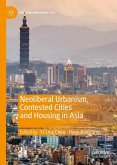This book contends that the Chinese economic reform inaugurated since 1978 has been a top-down passive revolution, in Gramsci's term, and that after three decades of reform the role of the Chinese state has been changing from steering the passive revolution through coercive tactics to establishing capitalist hegemony. It illustrates that the labour law system is a crucial vehicle through which the Chinese party-state seeks to secure the working class's consent to the capitalist class's ethno-political leadership. The labour law system has exercised a double hegemonic effect with regards to the capital-labour relations and state-labour relations through four major mechanisms. However, these effects have influenced the Chinese migrant workers in an uneven manner. The affirmative workers have granted active consent to the ruling class leadership; the indifferent, ambiguous and critical workers have only rendered passive consent while the radical workers has refused to give any consentat all.
"The rich details and careful and nuanced analysis produce a multifaceted portrait of the various ways Chinese migrant workers engage/disengage, negotiate or challenge the state-constructed legal hegemony. The result is a compelling and nuanced argument that elucidates the wide variety of possibilities and sheds new light ... . Hegemonic Transformation makes an important contribution to the literature and will be essential reading for anyone who wants to better understand Chinese labour politics, the political economy of Chinese market ... ." (Lu Zhang, Global Labour Journal, Vol. 9 (03), September, 2018)
"Hui has produced an important contribution to the literature on labour politics, civil society, and legal reform in China, and her deep and systematic theoretical engagement brings fresh perspective to these issues. Hui's work should be required reading for anyone interested in the academically and practically crucial question of why Chinese workers submit to their ownexploitation." (Eli Friedman, The China Quarterly, Vol. 234, June, 2018)
"Hegemonic Transformation represents an important contribution to the field of Chinese labor studies. Not only does it convincingly address the fundamental paradox of labor in contemporary China (i.e., the coexistence of blatant labor abuses with well-developed labor legislation), it also indicates promising new avenues for future research. I highly recommend it." (Ivan Franceschini, The China Journal, Vol. 81, January, 2018)
"Hui has produced an important contribution to the literature on labour politics, civil society, and legal reform in China, and her deep and systematic theoretical engagement brings fresh perspective to these issues. Hui's work should be required reading for anyone interested in the academically and practically crucial question of why Chinese workers submit to their ownexploitation." (Eli Friedman, The China Quarterly, Vol. 234, June, 2018)
"Hegemonic Transformation represents an important contribution to the field of Chinese labor studies. Not only does it convincingly address the fundamental paradox of labor in contemporary China (i.e., the coexistence of blatant labor abuses with well-developed labor legislation), it also indicates promising new avenues for future research. I highly recommend it." (Ivan Franceschini, The China Journal, Vol. 81, January, 2018)

